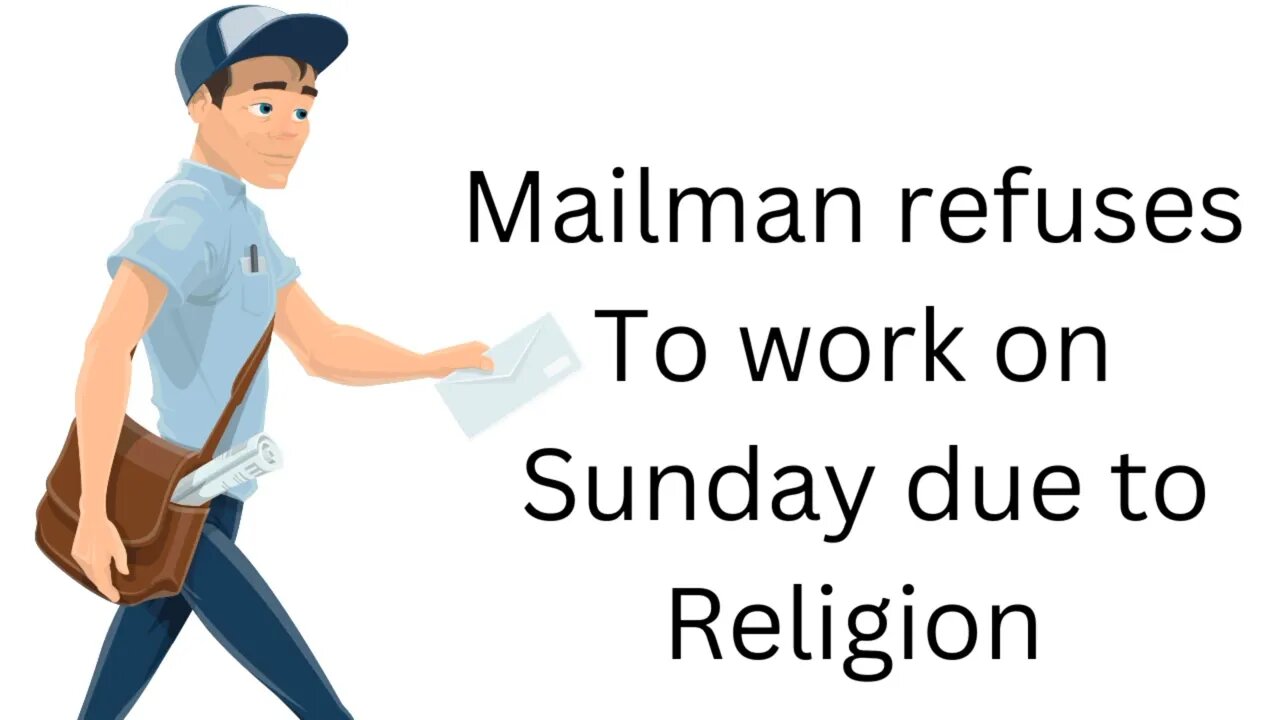Premium Only Content

Postal Worker's Lawsuit Highlights Clash Between Religious Accommodation and Business Interests
https://www.newsbreak.com/@c/1608581?s=01
Title: Postal Worker's Lawsuit Highlights Clash Between Religious Accommodation and Business Interests
The case of former postal worker Gerald Groff has thrust the issue of religious accommodation into the spotlight. Groff, who observed the Sabbath on Sundays, was exempted from working on Sundays until the Postal Service entered into a memorandum of understanding with the National Rural Letter Carriers' Association in 2016. Groff argued that the Postal Service violated Title VII of the Civil Rights Act by requiring him to work on Sundays, while the Postal Service claimed that accommodating Groff's religious beliefs would impose an undue hardship on the agency.
The legal dispute hinges on the concept of "undue hardship," which refers to the level of difficulty or expense an employer would incur in accommodating an employee's religious beliefs. Under Title VII, employers are required to reasonably accommodate religious observances unless doing so would pose an undue hardship.
The Supreme Court set the standard for undue hardship in a 1977 case, Trans World Airlines v. Hardison, which held that an employer can deny a religious accommodation if it imposes more than a minimal cost on the business. Groff is asking the Supreme Court to revisit that standard, arguing that it has evolved into a per se rule that virtually any cost to an employer counts as undue hardship, thereby undermining the protection of religious employees under Title VII.
The Postal Service argued that granting Groff's requested accommodation would have imposed an undue hardship on the agency by requiring it to violate the memorandum of understanding with the rural carrier associates' union, operate with insufficient staff, and burden workers. The Justice Department, which is representing the Postal Service, cited testimony that Groff's absences caused resentment among his coworkers and led to staffing challenges and difficulty completing deliveries.
The case has attracted a flurry of amicus briefs from religious groups and labor unions. Religious groups, including the Union of Orthodox Jewish Congregations of America, the Muslim Public Affairs Council, and Church of Jesus Christ of Latter-Day Saints, have argued that denying a religious accommodation based on popular opposition subverts the purpose of a civil rights statute. Labor unions, including the American Postal Workers Union, have warned against granting special religious preferences that would undermine the entitlement of other workers to a day of rest.
The case highlights the tension between the protection of religious freedom and the interests of businesses. Employers have a duty to accommodate their employees' religious beliefs to the extent feasible, but they also have a legitimate interest in maintaining their operations and avoiding undue hardship. The Supreme Court's decision will likely provide guidance on how to strike a balance between these competing interests.
As the case moves forward, it is important to remember that religious accommodation is not only a legal issue but also a moral and ethical one. Employers should strive to create a workplace that respects the diversity of their employees' beliefs and practices and seeks to accommodate them to the fullest extent possible without compromising the business's operations. By doing so, they can not only comply with the law but also foster a culture of inclusivity and respect.
-
 LIVE
LIVE
VOPUSARADIO
9 hours agoPOLITI-SHOCK! Back To Back Guests: Rebekah Koffler & Dr. Michael Schwartz
76 watching -
 59:44
59:44
The StoneZONE with Roger Stone
2 hours agoWill the Perps of the Russian Collusion Hoax Face Justice? | The StoneZONE w/ Roger Stone
2.6K2 -
 2:25:06
2:25:06
WeAreChange
4 hours agoCOMPLETE COLLAPSE: Media Spiraling Into OBLIVION As It Tries To Take Out Elon and Trump
47.6K9 -
 1:56:08
1:56:08
Darkhorse Podcast
8 hours agoTaste the Science: The 253rd Evolutionary Lens with Bret Weinstein and Heather Heying
63.8K73 -
 1:38:09
1:38:09
Barry Cunningham
5 hours agoTRUMP DAILY BRIEFING: Dems Threatening Trump Cabinet And Freaking Out Over Tariffs (and more!)
44.7K68 -
 4:31:46
4:31:46
Viss
7 hours ago🔴LIVE - Viss Arena Breakout Dominance!
98.8K38 -
 54:17
54:17
Sarah Westall
7 hours agoPanopticon Prison Surveillance State is Humanity’s Current Reality w/ Eric & Glenn Meder
23.6K16 -
 54:56
54:56
LFA TV
1 day agoKamala’s $1.4 Billion Campaign Failure | Trumpet Daily 11.27.24 7PM EST
19.8K -
 1:34:04
1:34:04
2 MIKES LIVE
3 hours ago2 MIKES LIVE #148 Pre-Thanksgiving News Edition!
10.2K -
 39:01
39:01
The Why Files
9 days agoSymbols of Power: Deciphering the Language of the Secret Elite
144K171